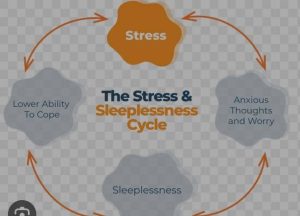By Mutalib Jibril

Insomnia is a sleep disorder characterized by difficulties in falling asleep, staying asleep, or experiencing poor-quality sleep.
Insomnia can manifest differently among individuals. While some may have difficulty falling asleep despite feeling tired, others may awaken in the middle of the night and struggle to return to sleep, anxiously observing the passing hours. It’s important to note that the definition of insomnia is based on the quality of sleep and how one feels after sleeping, rather than solely focusing on the number of hours slept or the speed of falling asleep. Even if someone spends a full eight hours in bed each night, if they experience daytime drowsiness and fatigue, it could be indicative of insomnia.
Types of Insomnia
Acute insomnia:Is the most prevalent form of insomnia, is typically of short duration, lasting from a few days up to a month. Often referred to as adjustment insomnia, it frequently arises due to environmental changes or stressful circumstances.
Chronic Insomnia: Lasting for at least three nights a week for a month or more, this is a long-term form of insomnia
Onset insomnia:It refers to the difficulty individuals face when trying to initiate sleep. It can manifest as either a short-term or chronic condition.
Comorbid insomnia: Is more prevalent than primary insomnia, arises as a result of underlying medical conditions or comorbidities.
Maintenance insomnia: It refers to the challenge of staying asleep or waking up prematurely and struggling to return to sleep. It can be caused by chronic medical conditions or psychological factors like depression, anxiety, or stress.
Symptoms of Insomnia
Difficulty falling asleep despite being tired.
Waking up frequently during the night.
Trouble getting back to sleep when awakened.
Unrefreshing sleep.
Relying on sleeping pills to fall asleep.
Daytime drowsiness, fatigue, or irritability.
Difficulty concentrating during the day.
Impaired performance at work or school.
Causes of Insomnia
Stress: whether related to work, school, health, finances, or family, can keep the mind active at night, resulting in difficulty falling asleep. Insomnia can be triggered by stressful life events or traumatic experiences, such as the loss or illness of a loved one, divorce, or unemployment.
Gene:Research indicates that a genetic predisposition may contribute to the likelihood of experiencing insomnia, suggesting that a tendency for this sleep disorder can be inherited within families.
Environmental Factors: Noisy or uncomfortable sleep environment, extreme temperatures, or disruptions during sleep.
Lifestyle Factors: Irregular sleep schedule, excessive consumption of caffeine or alcohol, nicotine use,and lack of physical activity.
Medical conditions:Various medical conditions can contribute to insomnia, including chronic pain, respiratory issues, gastrointestinal disorders, hormonal imbalances, and neurological conditions.
Psychological factors such as stress, anxiety, depression, and other mental health conditions can play a significant role in the development of insomnia.
Treatment of Insomnia
Sleep hygiene:Maintaining good sleep hygiene involves establishing a regular sleep schedule, ensuring a comfortable sleep environment, and incorporating relaxation techniques into your routine.
Avoid heavy meals at Night:To optimize sleep, it is advisable to have dinner earlier in the evening and avoid consuming heavy or rich foods within two hours of bedtime. Spicy or acidic foods, in particular, can lead to digestive discomfort and heartburn, potentially disrupting sleep by causing awakenings during the night.
To promote better sleep, it is recommended to refrain from using electronic screens at least one hour before bedtime. The blue light emitted by screens can interfere with the production of melatonin in your body and hinder feelings of sleepiness. Instead of engaging with devices like TVs, phones, and other electronic devices, consider opting for alternative relaxing activities such as reading books.
Avoid naps:It is advisable to avoid taking daytime naps as they can interfere with nighttime sleep. If you find it necessary to nap, it is recommended to limit it to a maximum of 30 minutes.
According to the American Academy of Sleep Medicine, it is recommended to stop consuming caffeinated beverages at least six hours prior to bedtime. However, individuals who are particularly sensitive to caffeine may need to discontinue its intake even earlier.
Cognitive Behavioral Therapy for Insomnia (CBT-I): A structured therapy focusing on changing behaviors and thoughts affecting sleep.
Addressing Underlying Conditions: Treating any underlying medical or psychological conditions contributing to insomnia.
